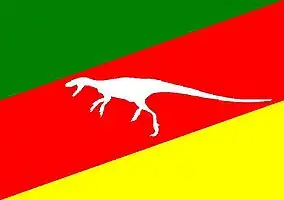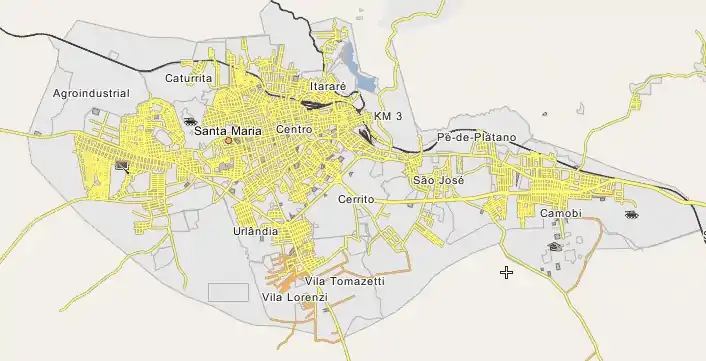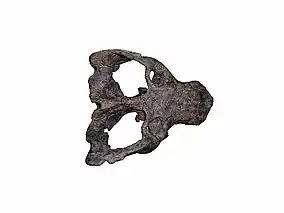Paleontological Sites of Santa Maria
The Paleontological Sites of Santa Maria are located in the city of Santa Maria, Rio Grande do Sul, Brazil and dating from the Triassic. Are in the Santa Maria Formation and Caturrita Formation.[1]
| Paleontological Sites of Santa Maria | |
|---|---|
 | |
| Location | Paleorrota Geopark Santa Maria, Rio Grande do Sul, |
| Coordinates | 29°41′42″S 53°47′43″W |
History
In 1901 the first fossils were found in the town of Santa Maria, which began the Geopark Paleorrota. Since then many sites have been discovered in the city, especially near the Hill Cerrito, with outstanding attention to Sanga da Alemoa that have rich history.
Tourism
The city of Santa Maria is a major road junction, with several highways across the city. The Hill Cerrito is surrounded by highways BR-287, BR-158 and RS-509. You should be prepared to receive tourists.
Museums
Santa Maria has two museums that contain fossils of the region:
- Museum Vincente Pallotti
- Educational Museum Gama D'Eça
Description of sites

1
2
3
4
5
6
7
8
9
10
11
12
13
14
15
16
17
18
19
20
Paleontological Sites of Santa Maria:
- 1) Arroio Cancela
- 2) Cabeceira do Raimundo
- 3) Arroio Passo das Tropas
- 4) Olaria Campus UFSM
- 5) Colégio Militar
- 6) Largo Padre Cargnin
- 7) Cerrito I
- 8) Cerrito II
- 9) Cerrito III
- 10) Sanga of Alemoa
- 11) Jazigo 5
- 12) Sanga do Armário
- 13) Vila dos Sargentos
- 14) Cidade dos Meninos
- 15) Vila Kennedy
- 16) Vila Caturrita
- 17) Bela Vista
- 18) Jardim Berleze
- 19) Esc. Xavier da Rocha
- 20) Silva Jardim
Notes and references

Young Exaeretodon, collected by Sergio Kaminski, in the Paleontological Site Arroio Cancela
See also
- Paleorrota Geopark
- Museum Vincente Pallotti
- Educational Museum Gama D'Eça
- Paleontological Site Arroio Cancela
- Paleontological Site Sanga of Alemoa
- Paleontological Site Jazigo Cinco
This article is issued from Wikipedia. The text is licensed under Creative Commons - Attribution - Sharealike. Additional terms may apply for the media files.